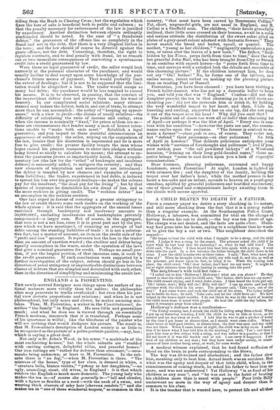ENGLAND a la FIORENTINO.
THE newly-arrived foreigner sees things upon the surface of na- tional manners more vividly than the native; the philosophic alien may penetrate to truths overlooked : but even then his par- tial view distorts proportions and relations ; and when he is not philosophical, but only acute and clever, he makes amusing mis- takes. Thus, M. Fiorentino, a writer in the Constitutionnel, de- scribes "the family " in England. He sees little and generalizes much ; and what he does see is viewed through an essentially French medium, insomuch that it is translated. Perhaps some of his ignorance is wilful ; like the blindness of the painter who will see nothing that would disfigure his picture. The result is, that M. Fiorentino's description of London society is as little to be recognized as the picture of a polite portrait-painter,—nay, less ; which is saying a great deal.
Not only is Sr. John's Wood, in his sense, " a multitude of the most enchanting houses," but the whole suburbs are "studded with smiling cottages, delightful villas, and peaceful homes." Our iron railings are "rather for defence than ornament,"—area- sneaks being unknown, at least to M. Fiorentino. In the sub- urbs there is "no fog,"—when M. Fiorentino is there. "The mistress of the house," type of her class, is dressed in white, a "creature belle, bianco vestita," "yenng as her daughters,"—no ugly, unsmiling, stout, old wives, in England : it is that which renders the English so much more domestic. The young lady who makes the tea is—of course she generally is—" tall and slender, with a figure as flexible as a reed—with the neck of a swan, and wearing thick clusters of ashy hair [cheveux cendres 5.']" and she 'stakes tea in " one of those wonderful teapots," so common in this country, "that must have been carved by Benvenuto Cellini." Fat, short, ungraceful girls, are not usual in England, and B. Cellini is a Sheffield man. The children, "their heads gracefully inclined, their little arms crossed on their bosoms, await in a calm and serious attitude the distribution of the sweet cakes piled on plates of a grey-pearl colour adorned with fantastic flowers." They never snatch the bread and butter, squall, or quarrel. The mother, "young as her children," " negligently embroiders a pat- tern, or turns over the leaves of a new Imok." The father, "half. hidden by his Times, peeps forth from time to time," does the sly but graceful John Bull, who has been brought from City or Strand in an omnibus with superb horses—he " peeps forth from time to time, and surveys with a satisfied look the details and ensemble of this charming picture." If the children interrupt him, he does not cry " Oh ! bother! " No, he forms one of the tableau, and smiles serene, intent rather on making up the pleasing picture than on reading Peel or Russell.
Fiorentino, you have been choused : you have been visiting a French ballet dancer, who has got up a domestic ballet to hoax you, and told you that was " England." Confess—did not the daughter present the tea to that charming pa in a still more en- chanting pas ? did not she persuade him to drink it, by holding the very wonderful teapot to her heart, and then, while he, kneeling and smiling, supported her on one leg, did she not pour it out of the teapot over his head ? Why did you omit that ? The public out of doors too were all en ballet that charming 1st of April—or perhaps it was the 31st of April. " Every one is con- tent with his condition "—however the parts are cast, the counte- nance smiles upon the audience. "The farmer is content to re- main a farmer "—stairs pale in uno, of course. They resist not, but "defend" their policeman—ce cher policeman No 10th of April in London ! That delicate policeman anticipates your wishes with "services of forethought and politeness "; and if you, poor author, pass " the tall powdered lackeys " of a West-end mansion, " leaning on their long gold-headed canes," those su- perior beings "seem to cast down upon you a look of respectful commiseration."
Dear footmen, pleasing policeman, contented and happy Londoners, sweet Fiorentino I At night, London is lighted up with crimson fire ; and the daughter of the family, holding the teapot over her father's head, while the mother presses to her heart a tea-cake and an infant, ascends to heaven on a pearl-grey omnibus, uplifted by graceful policemen and beatified conductors; one of those grand and compassionate lackeys awaiting them in the clouds with serene approval.


























 Previous page
Previous page